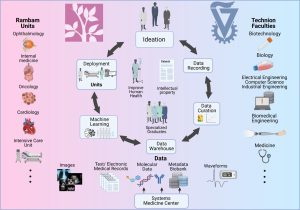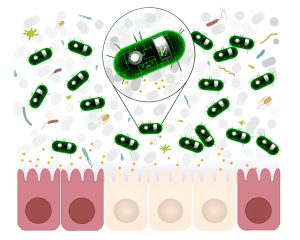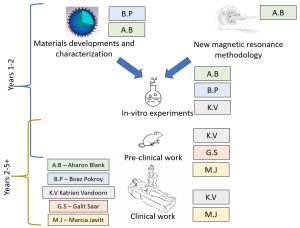Tech for Human Health
Artificial intelligence in healthcare, synthetic biology in electronics and a new non-invasive approach in clinical diagnosis are the winning research proposals supported by the Technion's Human Health Initiative (THHI)
Three research groups have won a unique grant from the Technion’s Human Health Initiative (THHI). THHI is the brainchild of Technion President Professor Uri Sivan and was established last year with the aim of promoting interdisciplinary research related to the worlds of health and medicine.
“Human health is one of the main challenges facing humanity in the 21st century,” said Technion President Professor Uri Sivan. “Like other huge challenges, a significant revolution in human health requires multidisciplinary efforts. To take full advantage of the Technion’s capabilities, this initiative will encompass a full spectrum of science and technology. It will support human health research and the conversion of research discoveries into applications and products that will serve the medical system and medical teams on the front lines. The idea is to build a bridge between medicine and life sciences, exact sciences, engineering, data science, and design. The initiative brings together researchers from different faculties on the premise that removing boundaries between faculties and disciplines is essential to preserve the Technion’s world-class status and to meet the challenges of the 21st century.”
To this end, the THHI organized an internal competition to support multidisciplinary research groups and innovative research projects, and to advance new fields of knowledge in the interface between medicine, life sciences, engineering, data science, and other disciplines. Thirteen teams from various Technion faculties entered the competition, with just three teams being chosen as the winners.
The winning entries were:
Closing the Loop: Technion – Rambam Center for Artificial Intelligence in Healthcare (CAIH)
The group’s members are Assistant Professor Joachim Behar, who is the project leader, Assistant Professor Uri Shalit, Professor Shie Mannor, Professor Lior Gepstein, Professor Shai Shen-Orr, Dr. Danny Eytan, Dr. Ronit Almog, and Dr. Oren Caspi.
“The goal of the new center is to promote the development of new AI for basic medical and clinical research resulting in significant and actionable benefit to patient care,” said Dr. Behar. “We hope that the center will serve as an interface between medicine, health sciences, and AI, and create synergy between the two institutions.”
“The idea of the new center is to create a loop between the world of medicine and the worlds of data and artificial intelligence,” said Prof. Uri Shalit. “As data professionals, we need vast amounts of data – and the clinical world needs experts to analyze this same data and derive useful insights from it. The new center will remove bottlenecks such as researchers’ access to the data and will also encourage a real crossover between Rambam’s clinical expertise and our data and model expertise. We are confident that the new initiative will create an ecosystem that will enable us to present analyses to improve diagnosis, treatment, and follow-up in the medical world. Moreover, it is very important to us that this same loop is closed by applying data-based models in the field, that is, in Rambam. For us scientists it is an important connection to the field and a significant means of influencing human well-being.”
The center’s joint activities, which will operate with funding from the Technion, and Rambam Medical Center began this month (March 2022). The opening event was held at Rambam on March 9, in collaboration with MIT, and attended by the President of the Technion Prof. Uri Sivan and the CEO of Rambam Prof. Michael (Miki) Halberthal. This followed on the heels of the “Datathon” – a competition in the field of data sciences that took place on March 7-8.
Harnessing Synthetic Biology and Ultra-Low Power Electronics to Monitor Signals in the Gastrointestinal Tract
The group’s members are Associate Professor Ramez Daniel, the project leader, Assistant Professor Naama Geva-Zatorsky, Professor Hossam Haick, Professor Eilam Yalon and Associate Professor Shahar Kvatinsky.
The group will work on developing innovative systems for monitoring gastrointestinal diseases. These systems will contain engineered bacteria that will program ultra-low power electronic circuits based on different components such as memristive devices, and this combination of biology and electronics will allow future users to study the metabolic pathways in the gastrointestinal tract and intervene effectively where necessary.
“Using tools from the world of synthetic biology, we will create bacterial (E. coli) cells that identify biomarkers in the digestive tract, process this information, and program nano-electronics devices called memristors using biochemical reactions,” said Prof. Daniel. “The required calculations will be performed in the bacterial cells using DNA, proteins and enzymes that are characterized by at least 1,000 times less energy consumption than any electronics device (e.g., transistor) – the minimal energy required for their activity. The memristors’ activity will be programmed directly by the bacteria from the nutrients that are abundant in the digestive system, and therefore no external energy source will be required for this system.”
“These systems will be installed in tiny capsules less than a few centimeters in size,” said Prof. Geva-Zatorsky. “And through them we will be able to explore new diagnostic strategies in favor of applied research and the development of new treatments for gastrointestinal diseases. The systems will provide real-time focused molecular analysis – an essential tool for continuous diagnosis of diseases.”
Metabolic MRI – a new non-invasive approach in clinical diagnosis, treatment and real time investigation of human diseases
The group’s members are Professor Aharon Blank, who will lead the project, Assistant Professor Katriene Vandoorne, Professor Boaz Pokroy, Prof. Marcia Javitt, and Dr. Galit Saar.
The aim of the project is to develop a technology for the use of MRI for rapid, effective, and safe medical diagnosis of various diseases.
MRI is a common and effective imaging technology that provides a wealth of information about physiological conditions based on the physical properties of the tissue – proton density, tissue relaxation times, and diffusion coefficients. However, in many cases this physical information alone is not enough, and more detailed knowledge is needed about various metabolites and their activity in the examined tissue.
Unfortunately, due to sensitivity problems, even the most advanced MRI systems detect only the metabolites found in very high dose tissue and are not sensitive enough to detect most metabolites for medical diagnosis. This problem can be solved in part by a technology called PET-CT, but this involves the use of harmful ionizing radiation and expensive radio tracers.
The technology developed by the group will provide important information about the metabolic properties of tissues and will expand our understanding in physiological processes, clinical diagnosis, and management of patient care.
The group aims to develop a method that increases the signal of metabolites of interest up to 1,000 times their normal intensity while maintaining this high intensity for several minutes, so that they can be mapped in common MRI systems.
The technology will be tested in pre-clinical trials at the Ruth and Bruce Rappaport Faculty of Medicine at the Technion and will then enter clinical trials. After efficacy and safety trials, the technology will be tested in various medical contexts, including in cancer and other diseases of the prostate, liver, and kidney; systemic inflammatory diseases; and brain tumors.





